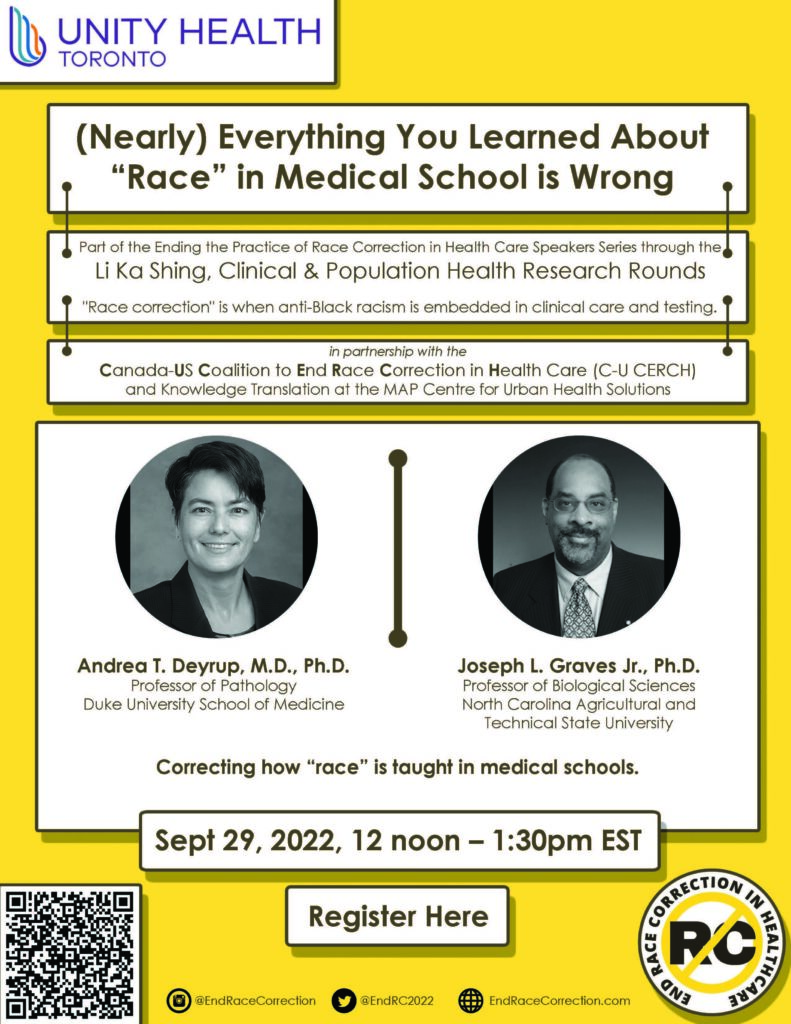Li Ka Shing, Clinical and Population Research Rounds, 2022
Ending the Practice of “Race Correction” in Health Care speaker series as part of the Li Ka Shing, Clinical and Population Research Rounds, 2022
Presented by Dr. Patricia O’Campo, Executive Director of the Li Ka Shing Knowledge Institute at Unity Health Toronto, in partnership with the Canada-US Coalition to End Race Correction in Health Care and Knowledge Translation at the MAP Centre for Urban Health Solutions.
Date and time of this virtual talk: Sept 29, 2022 from 12 pm – 1:30 pm EST
Please click here for a video recording of the talk.
About this talk: Andrea T. Deyrup M.D., Ph.D. and Joseph L. Graves, Jr., Ph.D. will discuss how the concept of “race” is misused throughout medical education and practice. Learners will leave the session with:
What is “race correction”? Health care providers often use tests to assess a patient’s health. In many cases, health care providers calculate test results differently for Black patients than they do for everyone else. Overall, “race correction” means that Black people are diagnosed late, or never diagnosed at all, for serious conditions from heart, kidney and lung diseases to cognitive impairment. It also means that Black people are systematically excluded from timely access to life-saving treatments like organ transplants and other surgeries. “Race correction” has no scientific basis because “race” is not biological. It is a social construct that is applied differently in different times and in different places. In fact, scientists have shown us that people have more in common genetically across “racial” groups than within them.
Speaker bios:
Andrea T. Deyrup, M.D., Ph.D.
Professor of Pathology
Duke University School of Medicine
Dr. Andrea Deyrup received her undergraduate degree from Princeton University in the Department of Ecology and Evolutionary Biology before joining the University of Chicago for her PhD, MD and residency. She trained in soft tissue pathology with Sharon Weiss at Emory University. Since 2015, Dr. Deyrup’s career has focused on medical education. At that time, she joined the faculty of the Duke Pathology Department as Course Director of the first-year medical school pathology. She served on the Undergraduate Medical Education Council for the Association of Pathology Chairs from 2020 to 2022, participated in the 2020-21 Duke Teaching for Equity Fellows Program and was a member of the Duke School of Medicine Health Professions Anti-Racism Task Force. She is one of the co-editors of the new Robbins Pathology textbook, Essential Pathology and of the upcoming 11th edition of Robbins and Kumar Basic Pathology. She is actively committed to antiracism efforts and to improving discussion of health disparities in medical education.
Joseph L. Graves, Jr., Ph.D.
Professor of Biological Sciences
North Carolina Agricultural and Technical State University
Dr. Joseph Graves, Jr. received his PhD in Environmental, Evolutionary and Systematic Biology from Wayne State University. His research in the evolutionary genomics of adaptation shapes our understanding of biological aging and bacterial responses to nanomaterials. He has multiple books on the biology of race including The Emperor’s New Clothes: Biological Theories of Race at the Millennium, The Race Myth: Why We Pretend Race Exists in America and Race and Racism: Answers to Frequently Asked Questions (with Alan Goodman). He leads programs addressing underrepresentation of minorities in science. He aids underserved youth in Greensboro via the YMCA chess program. He has also served on the Racial Reconciliation and Justice Commission, and COVID Vaccination Task Force of the Episcopal Diocese of North Carolina. He serves as the science advisor to the Chicago and New Brunswick Theological Seminaries through the AAAS Dialogues of Science, Ethics, and Religion (DoSER) program.

Below please find important background materials:
For any questions please contact LKSKIResearch@unityhealth.to